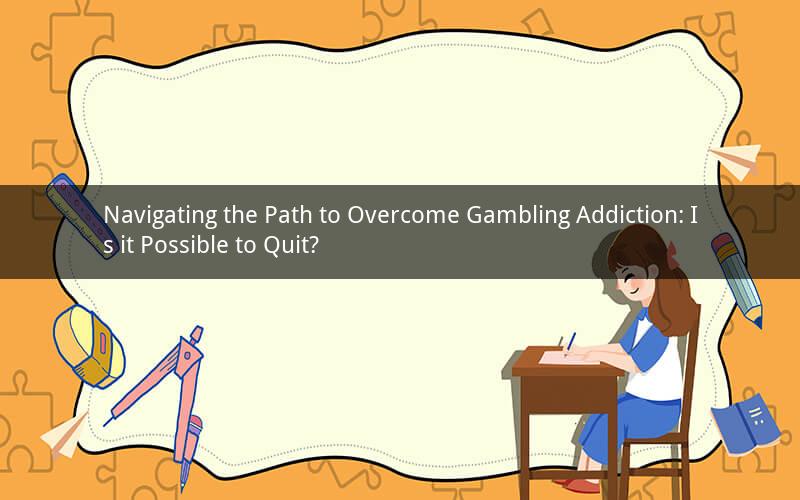
The concept of quitting gambling is a journey fraught with complexities and challenges. As the allure of the thrill and the potential for financial gain continues to entice individuals, the reality of addiction and its devastating effects becomes ever more apparent. This article delves into the question: Is it possible to quit gambling? We will explore the factors that contribute to addiction, the signs of problem gambling, and the various methods and strategies available to help individuals break free from this harmful habit.
Understanding Problem Gambling
Problem gambling, often referred to as gambling addiction, is characterized by an uncontrollable urge to gamble, despite negative consequences. It is a behavioral addiction that can affect individuals of all ages, backgrounds, and socioeconomic statuses. To determine if it is possible to quit gambling, one must first understand the nature of the addiction and the factors that contribute to its development.
1. What are the common risk factors that contribute to the development of gambling addiction?
- Genetic predisposition
- Personality traits, such as thrill-seeking and impulsivity
- Early exposure to gambling
- Mental health disorders, such as depression, anxiety, and substance abuse
- Social and environmental factors, such as exposure to gambling opportunities and peer pressure
2. What are the signs and symptoms of problem gambling?
- Preoccupation with gambling
- Needing to gamble more to achieve the same level of excitement
- Lying about gambling activities
- Difficulty controlling gambling behavior
- Reluctance to seek help
- Financial, social, and occupational problems due to gambling
Strategies for Quitting Gambling
Quitting gambling is a challenging endeavor, but it is indeed possible with the right approach and support. Below are some effective strategies for overcoming gambling addiction:
1. Seek Professional Help
- Therapy: A therapist, such as a psychologist or counselor, can provide guidance and support in addressing the underlying causes of addiction.
- Support groups: Joining a support group, such as Gamblers Anonymous, can offer a sense of community and understanding from others who have experienced similar challenges.
2. Develop a Strong Support Network
- Family and friends: Communicate openly with loved ones about your struggles and seek their support.
- Coaches and mentors: Surround yourself with individuals who can offer encouragement and advice throughout your journey.
3. Identify and Avoid Triggers
- Keep a journal to identify gambling triggers, such as specific locations, people, or situations.
- Create a plan to avoid or cope with these triggers when they arise.
4. Replace Gambling with Healthy Alternatives
- Engage in hobbies and activities that provide fulfillment and distraction from gambling.
- Develop a routine that includes physical exercise, healthy eating, and adequate sleep.
5. Set Realistic Goals and Celebrate Progress
- Establish clear, achievable goals to monitor your progress.
- Acknowledge and celebrate milestones to stay motivated and focused.
The Importance of Perseverance
The journey to quitting gambling is not without its setbacks and challenges. It is essential to maintain a strong resolve and remain persistent in the face of adversity. While it may seem daunting, countless individuals have successfully overcome gambling addiction by following these strategies and seeking the necessary support.
1. How long does it take to recover from gambling addiction?
- Recovery from gambling addiction is a unique process for each individual. Some may experience immediate improvements, while others may require ongoing support and treatment for years.
2. What are some potential relapse triggers that individuals should be aware of?
- Relapse triggers can vary widely among individuals. Some common triggers include financial stress, interpersonal conflicts, and exposure to gambling opportunities.
3. How can family members and friends support a loved one struggling with gambling addiction?
- Family members and friends can offer support by providing encouragement, setting boundaries, and seeking professional help when needed.
4. What resources are available for individuals struggling with gambling addiction?
- There are numerous resources available, including therapy, support groups, and hotlines. Online platforms, such as Gamblers Anonymous and Gambling Therapy, also offer valuable information and support.
5. How can individuals maintain their sobriety from gambling addiction?
- Maintaining sobriety from gambling addiction requires a combination of strategies, including ongoing therapy, a strong support network, and the commitment to avoiding triggers and engaging in healthy habits.
In conclusion, it is indeed possible to quit gambling. With determination, support, and the right strategies, individuals can break free from the grip of addiction and rebuild their lives. By understanding the factors that contribute to gambling addiction, identifying signs of problem gambling, and seeking appropriate support, individuals can overcome this challenging habit and embark on a path to a healthier, more fulfilling life.